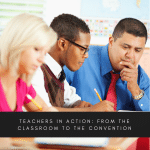Today marks the 129th year that Punxsutawney Phil (well, maybe the 30th version of him) will come out of his burrow to either see his shadow or not, declaring whether winter will be extended by 6 weeks, or whether spring is pending.
However, after today, there’s still 20 more weeks of blizzards to endure. They don’t smash snow in your face, instead, they bring television, radio, and print ads. There will be phone calls pleading for money. There will be hurt feelings. There will be heated rivalries and contentiousness.
There will also be a time for a lesson.
Teachers, do not eschew the teachable moment that is the 2016 election. It has been one of the most bizarre in the modern era thus far, and we need to capitalize on this moment by teaching our students – and modeling good citizenship ourselves. Here are some things to keep in mind:
Yes, you can model good citizenship by voting. Are you registered to vote? Do you vote? In the local elections last year, less than 20% of eligible voters turned out on Election Day. However, nearly 85% of our teachers voted. That means the politicians came to us, trying to earn our vote by learning about issues that were important to teachers.
Be non-partisan in your education. Our profession has been labeled “the most liberal in America,” but that hardly stops a good teacher from teaching fairly about issues. Encourage students to go to the source: the party or candidates’ webpages (especially through Ballotpedia) are good places to start. Then have them play devil’s advocate and challenge the authenticity of the issues.
1.Try to add some fun. The New York Times (though 2011) has a few fun ideas that vary through age groups, such as debate day bingo, mock election, visiting polling places with an adult, and contacting city hall. Scholastic Magazine also has a few more items (though more for elementary).
2.Teach them the vocabulary. What’s the difference between a primary and a caucus? What’s an absentee ballot? Why do you have to be 18 to vote? What’s a swing state? The Huffington Post does a great job of discussing these issues.
3.Share the Winston Churchill quote “Democracy is the worst form of government, except for all others that have been tried.” Have students debate this.
4.Have students debate certain issues within the school. Tip O’Neill once said that “all politics are local.” That can’t be any more true than in school. What issues do they think need to be solved at your school? What ones would they protect? How could they save money or spend it better?
5.Connect students to elected officials. Invite them to your class (you’d be surprised how much they love to come to schools). Have students write letters, or write a class letter. Call their office and video conference. Whatever it takes, teach students that their government is there to serve them, and that it’s their job to
6.Teach students how to budget. In a world with unlimited needs and limited resources, we have to pick and choose where and how we spend our money. That applies at home as well as with tax money. Students need to know that there aren’t blank checks. Click here to provide a few lessons. Then, after you teach them about this issue, have them look at the National Debt clock. Decorate your room with “mind blown” memes that day.
7.Ask students if they plan to vote. Some people just have such little faith in the process that they will not participate. Others can’t wait. It’d be great to hear what the students say for themselves.
8.Empower them to be part of (and maybe even run) their democratic-republic. Somebody out there is teaching the next President of the United States. Somebody else is teaching the next Speaker of the House. Others are teaching governors, members of the Cabinet, and future school board members. Don’t blow the opportunity to provide the lesson.
In closing, I’d like you to think of Phil Connors, Bill Murray’s character from the movie – aptly titled – Groundhog Day. Connors, a TV weather man, hates Groundhog Day as much as the average teacher hates elections. But it’s not until he embraced his spirit of the community is he able to stop the painful day from repeating itself over and over again.
May we learn that lesson, too. Elections seem like they’ve gone down the path of repetition. We can move onto a new day – if and when we embrace the idea of participating in and teaching about the importance of Election Day.




